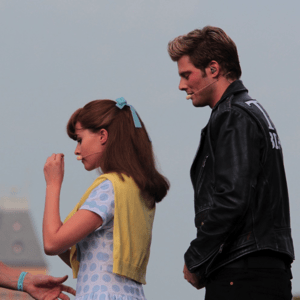Is Grease Sexist?
I once told a friend of mine that I think Grease is horribly sexist because the plot is basically: girl changes herself to get the guy. He responded, “I always thought it was her throwing off negative social norms. It’s not like the whole goody two shoes thing was good.” His sentiments versus my own are the crux of the argument about whether Grease is a sexist movie, or one that supports feminist ideals. Some view Sandy’s end of movie transformation into a leather-pants-wearing “bad girl” as her rejecting a socially required good girl persona, while others view it as her simply becoming what her love interest, Danny Zuko, wants.
The most unusual thing about Grease is that the film frames being a “bad girl” (i.e. a sexually active girl) as a positive thing despite taking place at a high school in the late 1950s. Rizzo, the secondary female lead, is the head of a badass girl gang, the Pink Ladies, who don’t let anyone tell them what to do and hold their own with the guys.
Rizzo mocks Sandy in the song, Sandra Dee, calling Sandy “lousy with virginity.” The comparison between Sandy and Sandra Dee is lost on most viewers. Sandra Dee was a big studio teen movie heroine in the 1950s. Teen movies only started being produced by big studios in that time period up until that point they were made by the “more authentic” smaller studios. Most teens at the time saw Sandra Dee’s “perfect and pure good girl” image as a fake, unrealistic projection of adult expectations. Sandy from Grease’s personality in the beginning of the movie is very similar to Sandra Dee’s image. Critics who argue that Grease is feminist-minded cite the Sandra Dee comparison as evidence that Sandy’s good girl persona is phony.
However, Sandy shows no signs of disliking her nature except for the fact that it prevents her from being with Danny. Her reaction to the song Sandra Dee is “Are you making fun of me, Riz?” She later gets the idea for her new look from seeing the hot girl who waved the flag at the drag race. It’s also implied that Danny fell in love with Sandy in all her purity over the summer, and that his problem, once school starts, has more to do with looking cool in front of his friends.
This brings us to the main reason why Grease is undoubtedly sexist: Danny Zuko is a misogynistic idiot, and we are told that we should throw ourselves at him. When Sandy appears again after their summer romance, he ignores her, and then when he finally goes on a date with her, he tries to make out with her despite her telling him to stop. Such date rape-y sentiments are present from the beginning of the musical, like when Danny’s best friend Kenickie asks, “did she put up a fight?” during the song Summer Nights. Now, this can partially be excused in that the story takes place in the 1950s (although the movie was made in 1978) so social norms were different. You can also argue that Danny does also try to change himself to be with Sandy. He joins a sports team, but as soon as Sandy shows up in her leather pants he throws his varsity jacket on the ground and chases after her.
At the end of the day, I think that all of the characters are idiots. It’s a very silly movie, and while these arguments are very important to discuss, they may not be totally worth discussing in terms of this particular film. To complicate things, some also view the entire movie as a satire of the teen movie genre. The good girl turns bad instead of the bad boy turning good. But the movie being satire is lost on most viewers, so is it really a satire then? If it is it’s not a very good one. Listen, it’s a movie that ends with the two leads flying into the sunset in a car (No, really); trying to argue deeper meaning in it might be pointless.
This article was also published on Teen Voices at Women’s eNews.
This piece was written as part of JWA’s Rising Voices Fellowship.







